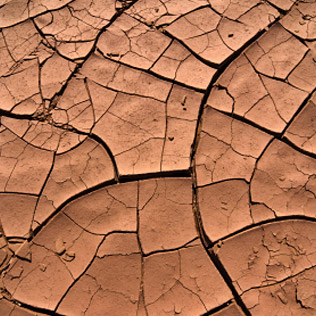
Dry skin is most likely one of those things that you never really think about until it becomes a problem. Here are a few good things to know about xerosis, or "common dry skin," to the rest of us.
How you know you have dry skin.
Most people experience dry skin on their arms, lower legs and the sides of their abdomen. But, this pattern can vary considerably from person to person. Furthermore, signs and symptoms of dry skin depend on your age, health status, locale, the amount of time you spend outdoors, and the underlying cause of the problem. People with naturally dry skin are more likely to feel a tightness of their skin after showering, bathing or swimming. They will also have skin that appears shrunken or dehydrated, and of course, it will feel rough and course a lot of the time. More symptoms of xerosis are severe itching (also known as pruritus), intense flaking, scaling, peeling and cracking of the skin, redness, and deep fissures that occasionally bleed.
What causes dry skin.
Whether or not you have dry skin depend or a wide range of environmental and personal factors. The good news is, most of these can be controlled...
- Heating and cooling - Probably the most common culprits indoors are central heating, wood - burning stoves, space heaters and fireplaces, as well as air conditioning. These all act to reduce the humidity and dry out your skin.
- The weather - Extreme temperatures tend to make many existing dry skin conditions worse. Whether it's the middle of winter, when temperatures and humidity levels are their lowest, or the middle of summer in dessert climates, where humidity is also very low.
- Bathing - Long hot showers and baths break down the lipid barriers in your skin. As does frequent swimming, particularly in pools with a lot of chemicals like chlorine.
- Soaps and detergents - Deodorant and antibacterial soaps are quite damaging to your skin, as are many shampoos, which dry out your scalp. Plus, many popular soaps and detergents strip lipids and water from your skin.
- Psoriasis - A skin condition marked by the rapid buildup of rough, dry, dead skin cells that form thick scales.
- Hypothyroidism - Hypothyroidism is a thyroid disorder caused by the production of too little thyroid hormones, this reduces the activity of your sweat and oil glands, leading to rough, dry skin.
- Dehydration - Diarrhea, vomiting, high fever, excessive sweating during exercise, or simply not drinking enough liquids can cause your body to lose more fluid than you take in. Also Alcohol, caffeine and certain prescription drugs can dry your skin significantly.
How to care for your skin.
Moisturize:
One of the simplest and most effective ways to prevent and care for dry skin is to use moisturizers. Moisturizers provide a seal over your skin to keep water from escaping. If your skin is extremely dry, you may want to apply an oil, such as baby oil, while your skin is still moist. Oil has more staying power than moisturizers do and prevents the evaporation of water from the surface of your skin.
Getting clean:
Since hot water effectively removes oils from your skin, it's best to limit baths and showers to fifteen minutes or less. Also, use warm water, rather than hot water. Another thing you can do while bathing to reduce the risk of dry skin is to only use cleansing creams, skin cleansers, or shower gels with added moisturizers. Clean Skin from Brave Soldier is one product that helps restore skin's natural moisture balance so even sensitive skin feels healthier and wonderfully hydrated. Utilizing the natural moisturizers and amino acids your skin needs, use of this mild yet effective cleanser every day will soothing, nourish and clean your skin without promoting dryness.
If you prefer traditional soaps to cleansing liquids then make sure that they have added fats and oils. Avoid deodorant and antibacterial detergents. Your skin should feel soft and smooth after washing, not tight or dry. Also, make sure to pat yourself dry, so as not to completely remove all the moisture from your body. And remember to apply oil or moisturizer after washing or bathing.
Humidify:
Use a portable humidifier to combat warm, dry indoor air.
Clothes and care.
Natural fibers such as cotton and silk allow your skin to breathe. Wool, on the other hand, although considered natural, can irritate even normal skin. And when you wash your clothes, try to use detergents without dyes or perfumes, both of which can cause skin irritation.
Know when it's serious.
For the most part, following the advice above will greatly reduce your risk of extreme dry skin. However, seek medical attention If your sleep is interrupted by dryness and itching, you have open sores from scratching, or if you have large areas of scaling or peeling skin. Not following up with a skin care professional can result in Dermatitis/Eczema (redness, cracking and inflammation of skin), Folliculitis (the inflammation of hair follicles), or Cellulitis (a bacterial infection of the skin tissue). Going to a doctor might also uncover that your skin issues are as a result of a more serious conditions.
